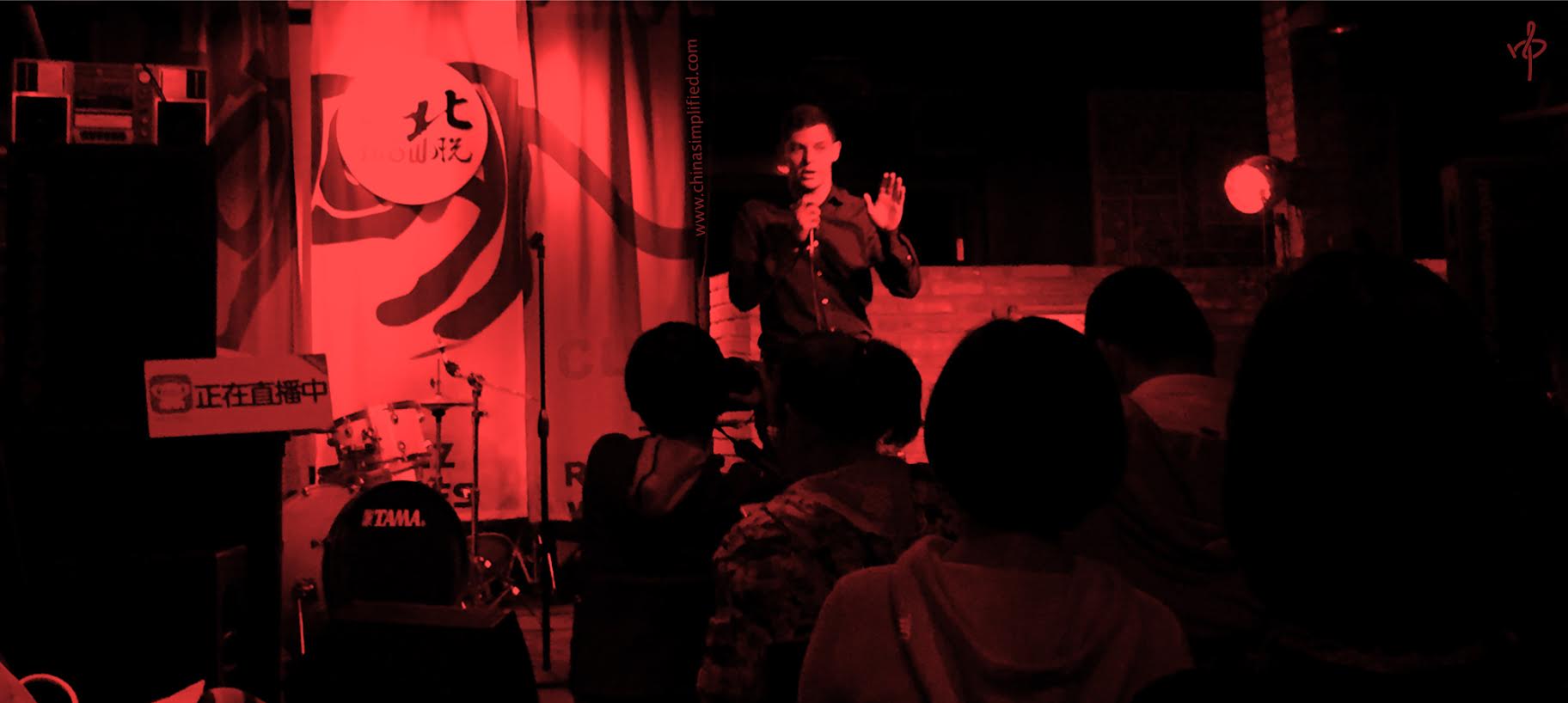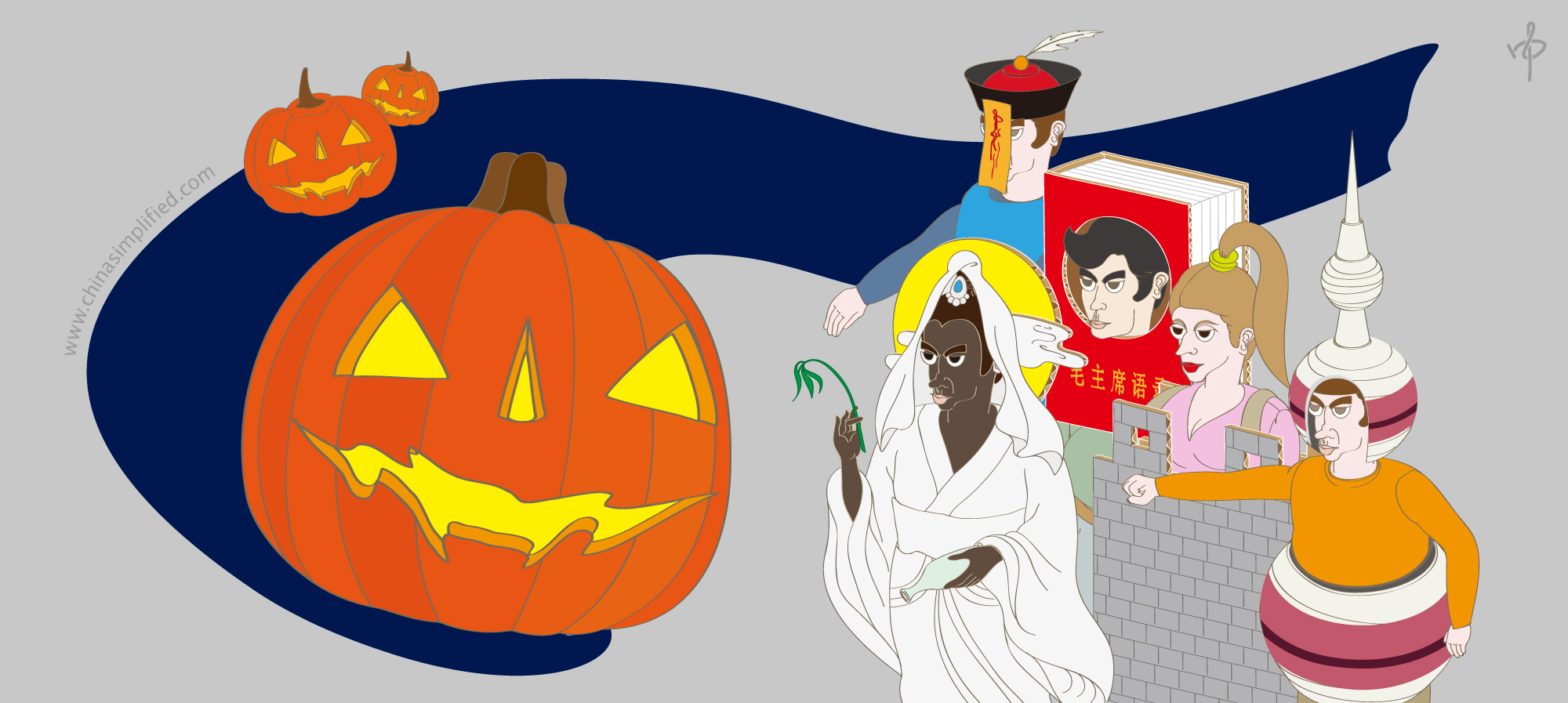This week we spoke with Jesse Appell, an American comedian living in Beijing, about his views on Chinese comedy and performing for a Chinese audience.
How’s the comedy scene in China?
There can’t be more than a hundred hard core stand-up comedians in the country, but tuōkǒuxiù (脱口秀, “talk show”) is on every TV station. So it’s gone from three years before, when you couldn’t find tuōkǒuxiù and no one knew what it was, to now it’s everywhere but no one knows what it is.
There are traditional xiàngsheng (相声, “crosstalk” comic dialog) performance chains and several cities have tuōkǒuxiù jùlèbù (脱口秀俱乐部, talk show clubs), but it’s a group of people not a location. Sometimes it’s just one person who’s built a cult of personality around themselves doing this. It’s a really bizarre small scene.
Who are some of your favorite comedians?
Shi Laoban (aka Jeff Shi) is really funny. He’s opened for Joe Wong before on his tours. The other fun thing in such a small scene, Joe will stop by our shows and open mics and just work stuff out, Da Shan (大山, Mark Rowswell) as well. I also like Song Quyu, from rural Shanxi. He has a really thick accent and a stutter. He has his own style and it’s really distinct. The underground scene is far superior to what is on TV.

“So it’s gone from three years before, when you couldn’t find tuokouxiu (脱口秀) and no one knew what it was, to now it’s everywhere but no one knows what it is.”
So is there a “China style” to comedy?
China doesn’t encourage you to create your own style. The people who go through formal training are kind of ruined by the training. But it depends on who you’re asking, because a TV station would rather hire somebody with the formal training who is not funny because they are “doing it right.”
What got you started here?
Originally, I was going to study how improv worked in China. Then I found some really great mentors including David Moser who advised me to study xiangsheng because its more traditional and I’ll learn a lot more about the culture. He introduced me to his xiangsheng master, Ding Laoshi (丁老师), who I’ve been studying with for three years.
What do you enjoy most about xiangsheng as an art form?
People go to see xiangsheng because it has its own history. So the audience is hyper-literate, which allows you to be super meta within the show. It’s a play within a play. You can do that in western comedy but it’s not as natural.
It’s really fun to be on stage with another person. Stand-up is intense. If a stand-up routine isn’t going well, you’re up there alone and you know how many minutes you have to fill, it’s really nerve-wracking. But being on stage with another performer is much more comfortable, especially for me coming from an improv background.
What adjustments do you make for a Chinese audience?
The easiest way to say it is that you’re performing in this culture for these people. Generally, you need more setup. Physical comedy works very well here. You can do the sorts of things on a Chinese stage that Americans would say you’re going overboard.
Are there limitations to what you can joke about?
A lot of things in China are only good within the context of knowing what you can and can’t do. For live shows the audience knows this, so if you make a really clever joke and manage to put this really great running metaphor between something that’s completely appropriate and what’s going on in the political situation, and you do it right, the audience loves it.
“A lot of things in China are only good within the context of knowing what you can and can’t do.”
What do you feel is the biggest Western misconception of China?
That they’re fundamentally different than we are. Come here, spend some time with some Chinese people, try to make some jokes, you’ll get them to laugh.
Any final advice for someone looking to crack the Chinese comedy market?
Just try and make stuff. Its like comedy everywhere. You’re never going to get it on the first try, so just share it and see what people think. Being interested culturally in why something doesn’t work means that even if you bomb hard you get really interesting things out of that night.
How’s the comedy scene in China?
There can’t be more than a hundred hard core stand-up comedians in the country, but tuōkǒuxiù (脱口秀, “talk show”) is on every TV station. So it’s gone from three years before, when you couldn’t find tuōkǒuxiù and no one knew what it was, to now it’s everywhere but no one knows what it is.
There are traditional xiàngsheng (相声, “crosstalk” comic dialog) performance chains and several cities have tuōkǒuxiù jùlèbù (脱口秀俱乐部, talk show clubs), but it’s a group of people not a location. Sometimes it’s just one person who’s built a cult of personality around themselves doing this. It’s a really bizarre small scene.
There’s an increasing audience understanding about the difference between an interview show and what Americans would call stand-up, but it’s definitely not there yet.
Who are some of your favorite comedians?
Shi Laoban (aka Jeff Shi) is really funny. He’s opened for Joe Wong before on his tours. The other fun thing in such a small scene, Joe will stop by our shows and open mics and just work stuff out, Da Shan (Mark Rowswell) as well. I also like Song Quyu, from rural Shanxi. He has a really thick accent and a stutter. He has his own style and it’s really distinct. The underground scene is far superior to what is on TV.
So is there a “China style” to comedy?
China doesn’t encourage you to create your own style. The people who go through formal training are kind of ruined by the training. But it depends on who you’re asking, because a TV station would rather hire somebody with the formal training who is not funny because they are “doing it right.”

“So it’s gone from three years before, when you couldn’t find tuokouxiu (脱口秀) and no one knew what it was, to now it’s everywhere but no one knows what it is.”
What first interested you in stand-up?
Probably the biggest thing that changed the direction of my life was being admitted into my high school improv group. We’d rehearse 15 hours a week, 3 hours a day, everyday after class. It was fun to have that outlet because I had this crazy crazy energy. All my friends are like, “Yeah, you’re way more mellow now,” which is kind of scary thinking about it.
Why China? Why not stand-up in the States?
I’m always interested in cultures. Chinese characters are interesting and the people are interesting. There was a part of me that was a glutton for punishment and doing the hardest thing I can find. You never just know Chinese. You’re never done.
I expected that when I graduated I wouldn’t do comedy anymore because I figured the real world would beat me down somehow. But luckily I discovered China where the real world doesn’t exist. (smiles)
So what got you started here?
Originally, I was going to study how improv worked in China. Then I found some really great mentors including David Moser who advised me to study xiangsheng because its more traditional and I’ll learn a lot more about the culture. He introduced me to his xiangsheng master, Ding Laoshi (丁老师), who I’ve been studying with for three years.
What do you enjoy most about xiangsheng as an art form?
People go to see xiangsheng because it has its own history. So the audience is hyper-literate, which allows you to be super meta within the show. It’s a play within a play. You can do that in western comedy but it’s not as natural.
It’s really fun to be on stage with another person. Stand-up is intense. If a stand-up routine isn’t going well, you’re up there alone and you know how many minutes you have to fill, it’s really nerve-wracking. But being on stage with another performer is much more comfortable, especially for me coming from an improv background.
“I’m always interested in cultures. Chinese characters are interesting and the people are interesting…You never just know Chinese. You’re never done.”
What adjustments do you make for a Chinese audience?
The easiest way to say it is that you’re performing in this culture for these people. Generally, you need more setup. Physical comedy works very well here. You can do the sorts of things on a Chinese stage that Americans would say you’re going overboard.
Whenever people meet you on the street they ask you: What’s your name? How old are you? How long have you been in China? Do you like China? Can you use chopsticks? The answers they need to know in order to be comfortable with you. In stand-up, they don’t get to ask the questions. So I need to answer for them as quickly and as funny as I can, but also with as much depth as I can, because the more depth I can get into the introduction, the more I’m trusted later.
Which of your gags work best here?
Stuff that involves English actually works very well, but I don’t think it’s just because it’s English but that they see it as authentic. There’s never going to be another Dashan. There’s no future for a foreign character in China that doesn’t own his foreigness. They can’t pretend to be Chinese.
Are there limitations to what you can joke about?
A lot of things in China are only good within the context of knowing what you can and can’t do. For live shows the audience knows this, so if you make a really clever joke and manage to put this really great running metaphor between something that’s completely appropriate and what’s going on in the political situation, and you do it right, the audience loves it.
“A lot of things in China are only good within the context of knowing what you can and can’t do.”
What do you feel is the biggest Western misconception of China?
That they’re fundamentally different than we are. Come here, spend some time with some Chinese people, try to make some jokes, you’ll get them to laugh. You may not get to the point where you can get up on stage and do it in front of a whole audience, but for a couple of people over dinner, tell a funny joke, be animated and people will laugh.
I know people that’ve come to China and don’t speak the language but can communicate and get their meaning across even though others don’t understand a word they say. That couldn’t happen if we were so different from each other.
Any final advice for someone looking to crack the Chinese comedy market?
Just try and make stuff. Its like comedy everywhere. You’re never going to get it on the first try, so just share it and see what people think. Being interested culturally in why something doesn’t work means that even if you bomb hard you get really interesting things out of that night.
Check out The Great LOL of China with Jesse Appell on the Asia Society website.









